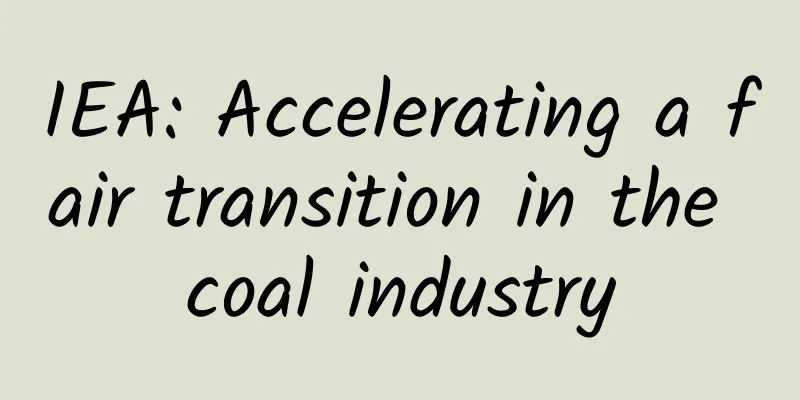IEA: Accelerating a fair transition in the coal industry

|
The International Energy Agency published “Accelerating a Just Transition for Coal”. In 2022, the IEA published its special report “Coal in the Net Zero Transition”. Since then, the policy and technology landscape has evolved. At the end of 2023, the 28th Conference of the Parties (COP28) to the United Nations Framework Convention on Climate Change (UNFCCC) called for a “phased reduction in the use of fossil fuels in the energy system”, including a specific call for Parties to start “accelerating efforts to phase out unabated coal power”. This report updates the 2022 report with new data and scenarios from the IEA. Net zero requires a rapid transition away from unabated coal-fired power generation Achieving the target of net zero greenhouse gas emissions from the energy sector by 2050, as adopted at COP28, depends crucially on a rapid shift away from reducing the use of coal for electricity generation. Global coal demand continues to grow in 2023 despite rapid growth in renewable energy generation. A growing number of countries have made commitments to net-zero emissions, which amounts to completely phasing out the use of coal and other fossil fuels. Transition from coal depends on rapid expansion of low-emission energy sources Only if alternative energy sources develop rapidly enough to meet the growing demand for electricity can it be possible to reduce dependence on the ever-increasing coal-fired power generation. Shifting coal-fired power plants from baseload generation to more flexible operation will reduce coal use while supporting the integration of alternative generation sources. New approaches needed to accelerate financing of transition away from coal Favorable economics for renewables are not, by themselves, sufficient to achieve a rapid transition away from coal power. Policies to boost clean energy financing must go hand in hand with measures to stop financing new coal power and to finance the early retirement of some coal assets. The transition away from coal is affordable Maintaining affordable electricity prices throughout the transition is critical. Policies for transitioning away from coal power must be people-centred and fair. Accelerating the transition away from coal will impact the workers and communities that rely on it. The nation’s commitment to reducing emissions and decarbonising electricity generation, if fully implemented, will inevitably lead to job losses in the coal industry, particularly in mining. |
<<: Why can iPhone only be upgraded and not downgraded?
>>: TCL "Happy Play" mobile phone review: a new choice for beginners
Recommend
Two girls smoked more than 200 bottles in one hour! What is the "laughing gas" that can paralyze or even kill people?
Recently, two girls in Beijing were administrativ...
Youzi Xiaobai's money-making project, earning 500+ Douyin mini program every day without any foundation
10-25 [New Course] Video account operation book l...
The world's largest! The glass ball in the Greater Bay Area that explores the beginning of the universe is fully built!
Author: Li Chuanfu Shi Xiangqi On October 11, 202...
Chen Changwen talks about entrepreneurship: Entrepreneurship is all about traffic (electronic document)
Course Catalog: Chen Changwen: The creation of th...
Qianxinan Mini Program Investment Company, how much does the pregnancy and childbirth mini program cost?
How much does it cost to attract investment in th...
The ultimate trick for efficient traffic generation of short videos—topic tags!
#Everyone should be familiar with this topic tag....
AirPods provide countless materials for joke makers, but you are wrong to think it is a rip-off.
The new iPhone 7 and iPhone 7 Plus released at Ap...
The "pigeon tree" from China has amazed all of Europe
In the spring of 1869, a French missionary named ...
It turns out you are such a "little axe"!
◎ Science and Technology Daily reporter Yang Xue ...
An inventory of major trends in the offline marketing and promotion industry in 2019!
Why has Alibaba held the Double Eleven offline sh...
Why buy an iPhone 11 for the same price? After trying out the vivo NEX3, I realized that this is the phone of the future.
The mobile phone market is becoming increasingly ...
A man opened a package and dozens of "needles" flew into his eyes! Be careful of this kind of thing, it's very common!
Mr. Xia from Ningbo encountered a thrilling accid...
The noise is too loud~How to reduce noise with headphones? Are noise-cancelling headphones good?
The symphony of the city is not always pleasant t...
Android 14 new security feature: IT administrators can now disable 2G networks
Google has introduced a new security feature in A...
IFR: 517,385 new industrial robots installed worldwide in 2021
The number of new industrial robots installed in ...









